Integrated Livelihoods Improvement and Sustainable Tourism in Khuvskul Lake National Park
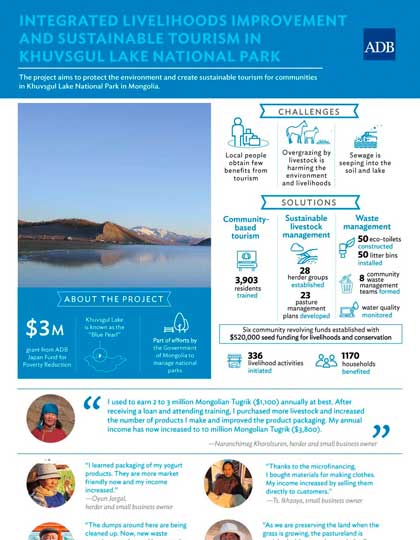

The project aims to protect the environment and create sustainable tourism for communities in Mongolia’s Khuvskul Lake National Park.
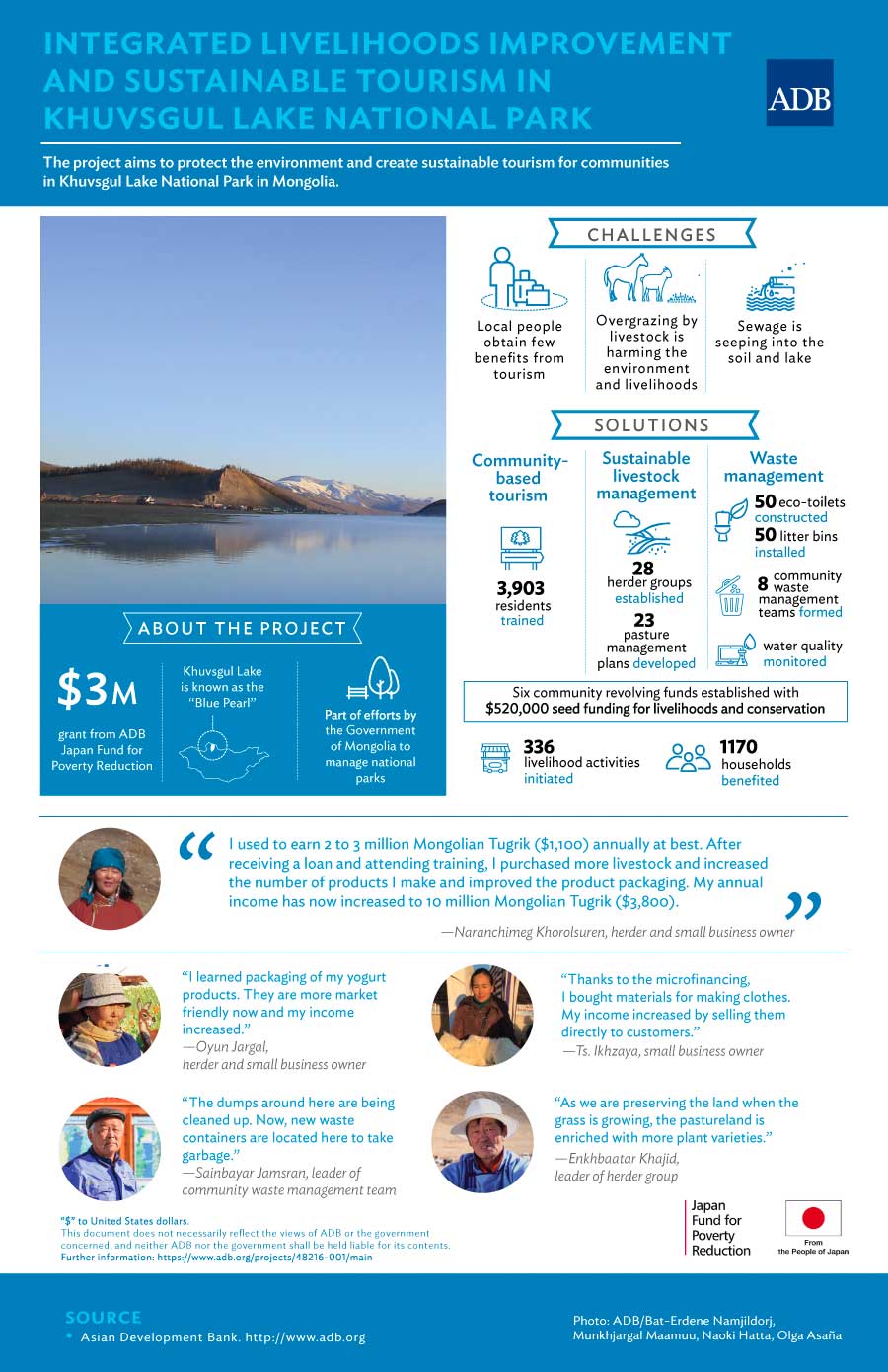
Source: Asian Development Bank.
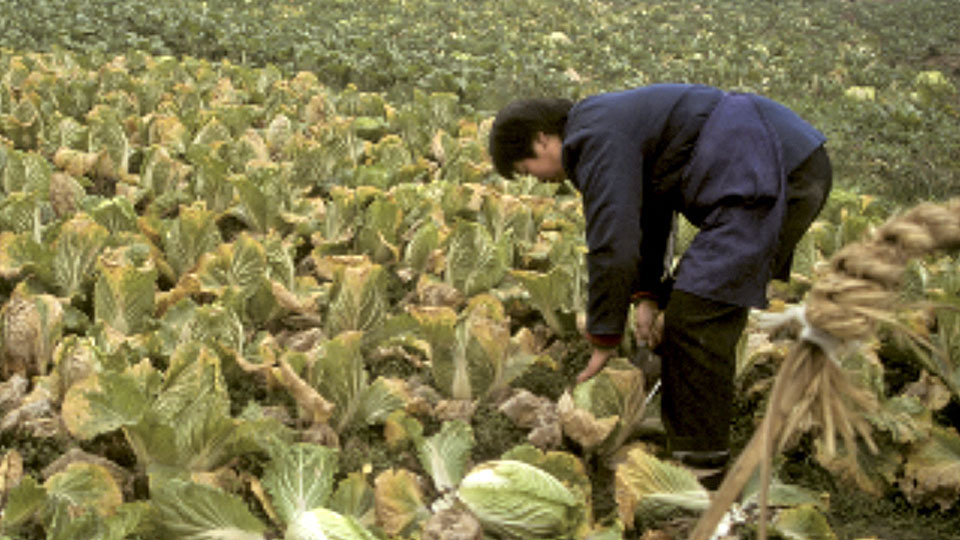
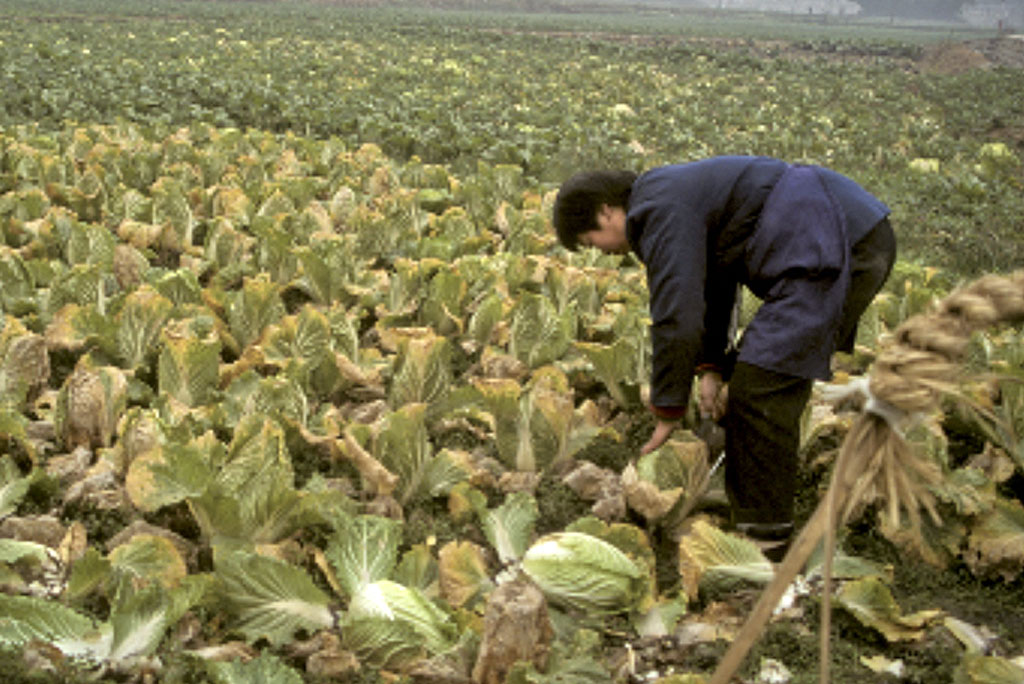
E-commerce can enhance rural livelihoods with public investments in facilities and training, access to funding, and favorable market conditions.
Overview
There has been rapid adoption of information and communication technology (ICT) in the People’s Republic of China (PRC) in the past decade. It is a world leader in e-commerce. However, access to ICT is concentrated in coastal and urban areas. The government has taken steps to strengthen infrastructure and capacity as well as provide funding to support e-commerce development in rural areas.
A study by the Asian Development Bank (ADB) and the International Food Policy Research Institute (IFPRI) looks at the impact of policies and investments in e-commerce on farmers. It shows that online selling is still new to farmers, but they are receptive to it because of the potential for higher income and self-employment.
However, a successful e-commerce venture is dependent on infrastructure and location, as well as the farmers’ relevant knowledge and skills. Government initiatives in these areas are needed for e-commerce to impact positively across the agriculture sector in the PRC.
Survey Results
The development and adoption of ICT have seen a significant increase in the PRC, with the number of internet users and mobile phone subscriptions reaching 772 million and 753 million in 2017, respectively. E-commerce has experienced even more rapid growth, as PRC has become the largest e-commerce market in the world since 2013. In 2017, it posted online sales valued at RMB 5,328.8 billion (more than $700 billion).
The study examined the ICT uses and development of e-commerce in rural PRC. It used data based on the two rounds of surveys done by the CCAP in 2017 and 2018, which covered 1,128 households that represent seven provinces in the PRC.
Survey results showed significant improvement in rural ICT infrastructure, logistic services, and the use of mobile phones by farmers. In 2017, all villages in rural PRC had access to mobile phone services, with about 70% having access to the internet. Nearly 90% of adults had a mobile phone, and 71% of them used a smartphone for social networking, news monitoring, watching videos, shopping, and online payment.
Many farmers are willing to venture into e-commerce, the survey reported. The number of villages doing e-commerce increased to 63% in 2017 from 41% in 2016. That year, only 3% of farmers sold their products online, but 25% of farmers surveyed were open to doing e-commerce. Those hesitant to go into the online business cited as reasons the lack of relevant knowledge and skills, lack of storage and preservation facilities, high logistical costs, and inadequate marketing skills.
The survey showed that purchasing agricultural products online was not popular, but almost 20% of farmers are willing to transact through e-commerce for convenience and lower prices. Reluctance to buy online was attributed to a lack of relevant knowledge and skills, poor trust in online transactions, and high uncertainty on the quality of products.
An intensive e-commerce survey was also conducted in 250 households from 20 villages in Shandong and Zhejiang provinces. Results indicated that e-commerce raised farmer’s income and self-employment as online transactions resulted in higher net profits and are more labor-intensive than offline sales.
While the overall use of ICTs is impressive and rapidly growing in PRC, E-commerce is yet to get a good start. Several challenges stand in its way. A primary concern cited by farmers is the lack of facilities that can store and guarantee the freshness of products for long-distance deliveries. This limits products for online sales and the range of potential buyers.
Another challenge is in marketing, with low trust in online transactions, especially involving agricultural products. The initial investment to set up an online store is high and usually prohibitive for small farms without external support. Even after a successful startup, the retention of customers may require additional costs.
Recommendations
The study recommends six measures to facilitate the development and adoption of ICT and e-commerce in rural areas.
E-commerce is more likely to benefit the regions with better infrastructure and location and farmers who have relevant knowledge, skills, and resources. The role of government is to close the gap between the haves and have-nots to broaden and deepen the impact of agricultural e-commerce.
References
ADB, CCAP, and International Food Policy Research Institute. 2019. Information and Communication Technology for Agriculture in the People’s Republic of China. Manila.
J. Hinrichs. 2018. How Technology Plus Agriculture is Triggering Growth in the People’s Republic of China. Development Asia.
X. Li, H.C. Tang, and J. Xu. 2019. Development Asia. What Can ASEAN Learn from the People’s Republic of China’s Poverty Reduction Strategy?, Development Asia.

Chief of Rural Development and Food Security (Agriculture) Thematic Group, Sustainable Development and Climate Change Department, ADB

Natural Resources and Agriculture Specialist, Sustainable Development and Climate Change Department, ADB

Professor, School of Advanced Agricultural Sciences and Director, CCAP, Peking University

Professor, Lanzhou University

Ph.D. student, School of Advanced Agricultural Sciences, Peking University
This blog is reproduced from Development Asia.
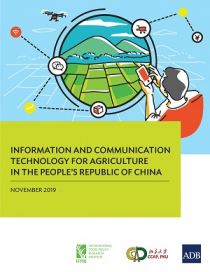
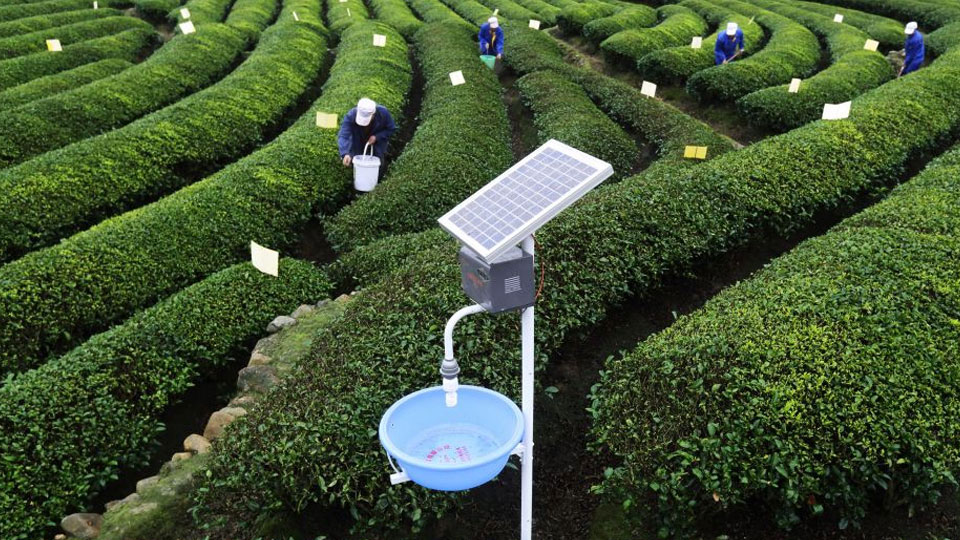
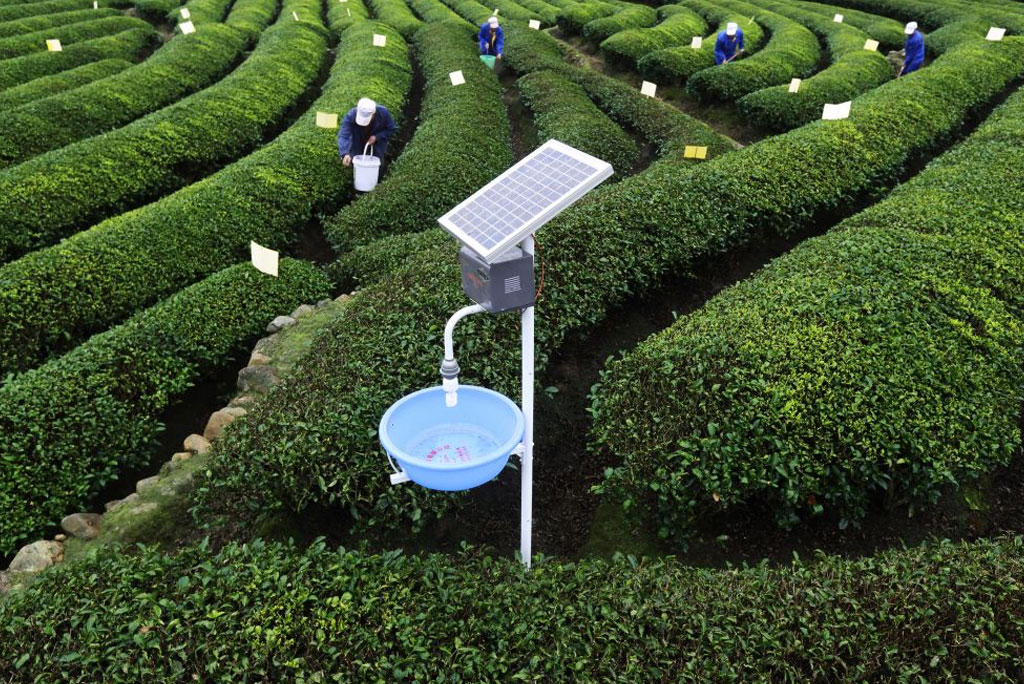
The People’s Republic of China (PRC) government recently released a rural vitalization strategy for the 2018-2022 period to promote poverty reduction, rural development, and green and inclusive growth. Despite a spectacular economic growth over the past 3 decades, economic, social, environmental, and institutional challenges remain.
These challenges are more profound in rural areas, home to more than 570 million people. In 2017, about 30 million rural people lived below the rural poverty line. Only 60% of the 600,000 villages have solid waste collection facilities, and 20% of villages had sewage treatment facilities. Chemical fertilizer application reaches 61 million tons per year, of which two-thirds has no impact on crops resulting in water and air pollution.
To tackle these remaining issues the rural vitalization strategy makes the management of solid waste and wastewater a priority and enhances rural development by modernizing agriculture. The application of information and communication technology (ICT), widely known as ‘agriculture Internet Plus’, is intended to increase agriculture productivity, reduce food safety risks and cut pollution from fertilizers and pesticides. Internet Plus agriculture encompasses the use of mobile internet, the application of network connected sensors, cloud computing, and big data along the food and agriculture value chain.
The internet is exerting a profound influence on the global economy and plays an important role in economic restructuring and urban-rural integration. Internet-based technologies, notably e-commerce, have vitalized rural markets in the PRC by improving the quality of agricultural produce and connecting small farmers with big markets.
With the rapid development of internet technology in the PRC over the last two decades, a set of Internet Plus technologies has had influential impacts on the national economy. A publication by the National Development and Reform Commission (NDRC) and the Asian Development Bank (ADB) shows that intelligent agriculture practices such as precision agriculture provide substantial benefits in pollution control which also help mitigate the contribution of agriculture to global climatic changes.
Satellite-based high-precision positioning technology combined with network-connected sensor technology can accurately monitor soil moisture, fertilizer content, weeds and pest locations to enable auto-piloted farm machinery to precisely apply fertilizer and pesticides. Efficient use of fertilizer and pesticide reduces soil, water and air pollution, as well as curbing greenhouse gas emissions.
The NDRC-ADB publication illustrates how data tracking systems can improve the quality and safety of agriculture products. Using a mobile app to scan the quick response or QR code, customers can access information such as cultivation base, sampling time, results of pesticide concentration tests, planting, harvest and sales transaction data.
Access to such information helps boost customer confidence in the product’s quality and safety. However, there isn’t enough incentive to apply these systems commercially, partly because national laws and regulations do not require traceability labels.
E-commerce has provided ways to sell agriculture products while reducing transaction costs and simplifying trading procedures. It has also built a two-way platform for the flow of consumer goods to villages and farm produce to cities.
The number of rural internet users in the PRC reached 209 million in 2017, of which 47% make online payments via mobile phones. E-commerce platforms in rural areas have given farmers with an average farm size of less than 1 hectare an affordable way of obtaining high quality inputs and new opportunities to market and sell their produce.
Giving farmers access to e-commerce requires support for agriculture extension services to standardize production, organize the farmers, and build logistics capacity in remote and poverty-stricken areas. The private sector, mainly Alibaba and Jingdong, have pioneered e-commerce platforms for agriculture and foodstuff trade.
But there is rising demand in less developed western regions of the PRC for public-private partnerships to develop platform-based traceability systems and rural logistics infrastructure for public goods. Connecting rural areas with e-commerce demands the adoption of a farm-to-market value-chain approach to create value for poor farmers, local agro-enterprises, and consumers. ADB has already gained considerable experience working with leading agro-enterprises in the PRC to design and implement public sector-financed value-chain investments.
The Supply and Marketing Cooperative of Gansu Province is working with ADB to develop an Internet Plus agriculture project to build the processing, cold-chain and logistics capacity of leading enterprises linked to provincial and county internet-based knowledge exchange and data analysis platforms.
These platforms will provide production and management advice through farmers’ mobile phones and can be directly linked through network-connected sensors to farm machinery, warehouses and delivery vehicles. Traceability systems for produced food products will be integrated into the platforms.
Such initiatives are crucial to the future prosperity of farmers in the PRC. Combining value-chain investment projects with access to e-commerce will accelerate rural transformation and integrate the agriculture sector into the wider economy.

Natural Resources Economist
This Op-Ed is reproduced from Asian Development Bank.
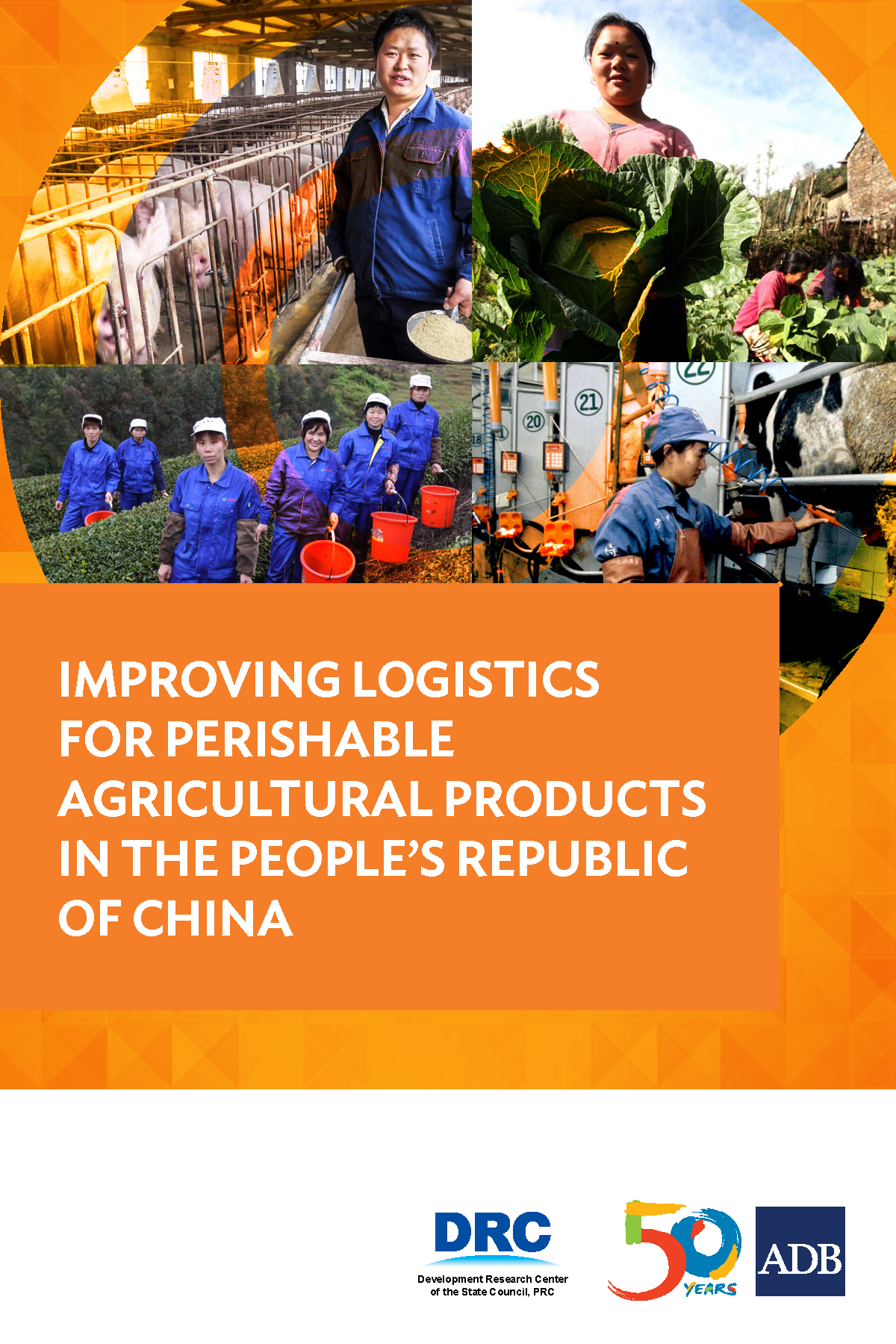
© 2025 Regional Knowledge Sharing Initiative. The views expressed on this website are those of the authors and presenters and do not necessarily reflect the views and policies of the Asian Development Bank (ADB), its Board of Governors, or the governments they represent. ADB does not guarantee the accuracy of the data in any documents and materials posted on this website and accepts no responsibility for any consequence of their use. By making any designation of or reference to a particular territory or geographic area, or by using the term “country” in any documents posted on this website, ADB does not intend to make any judgments as to the legal or other status of any territory or area.
